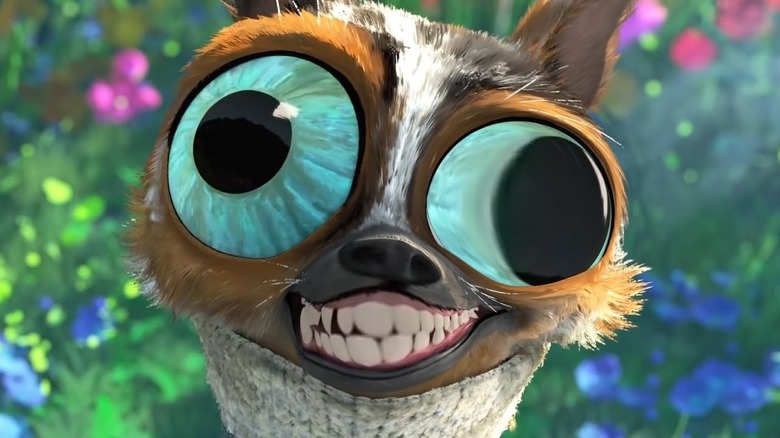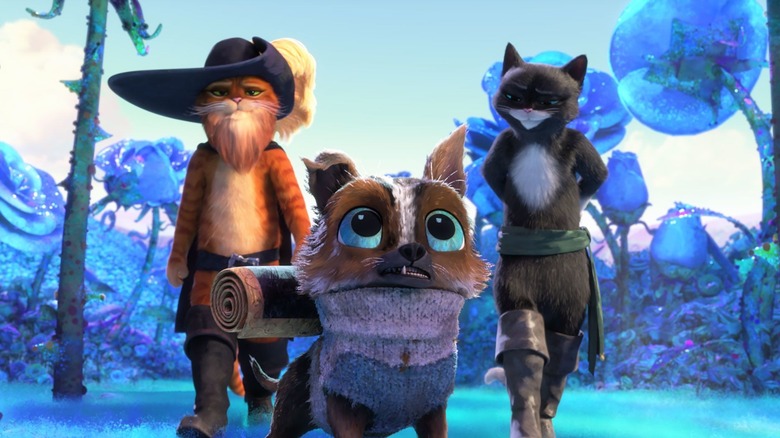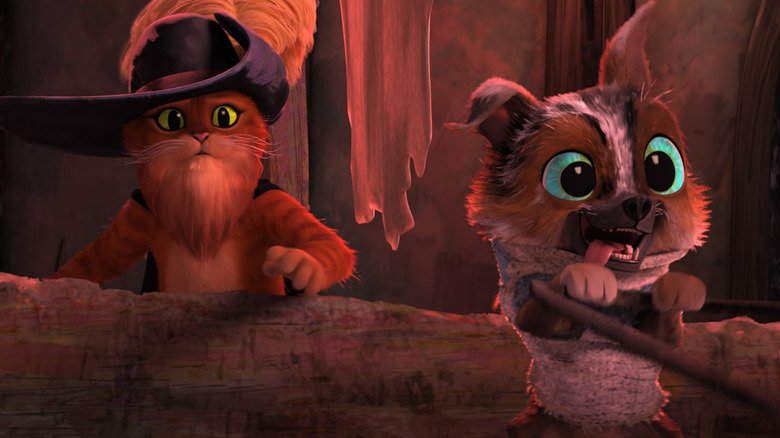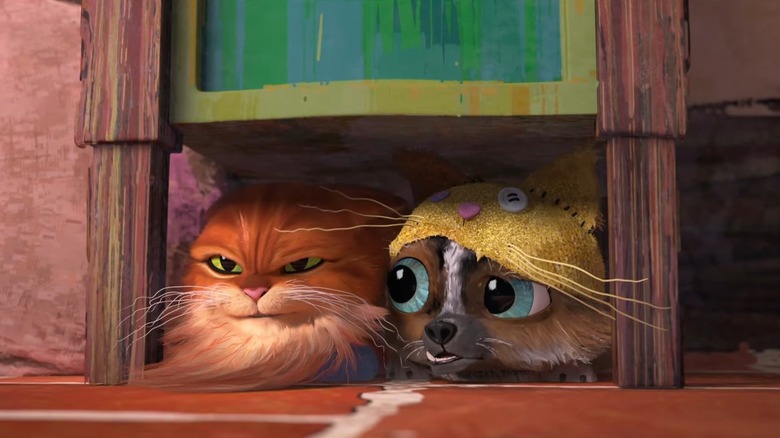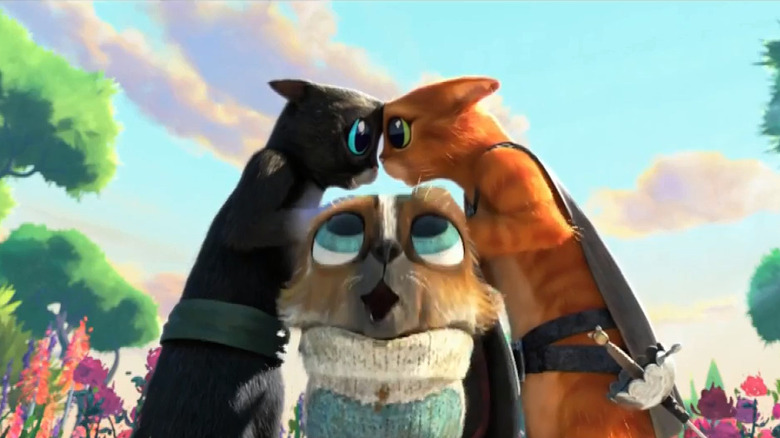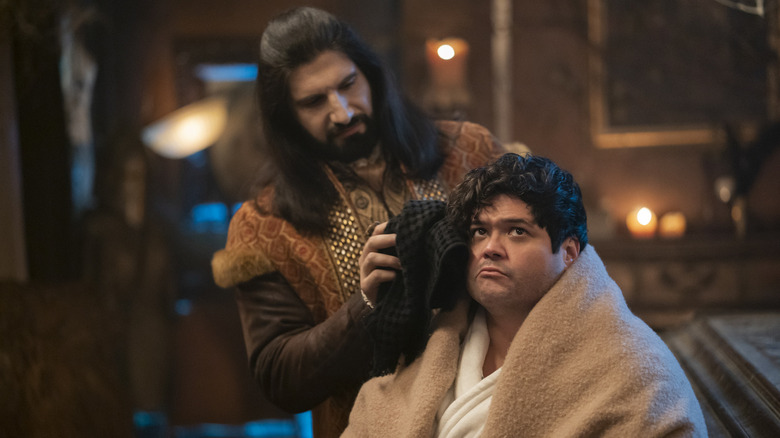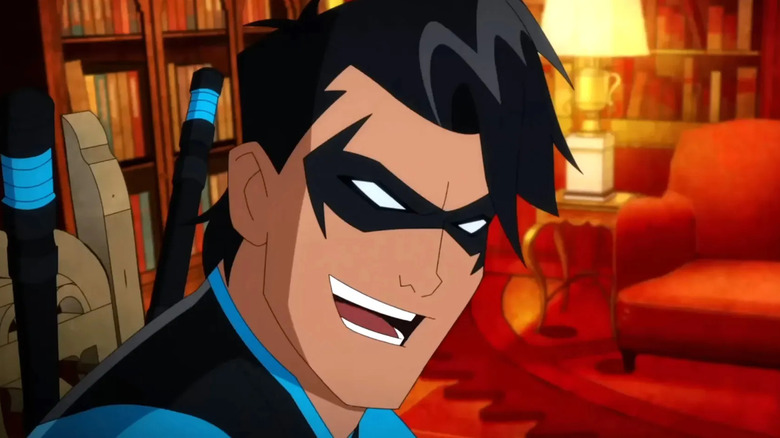Harvey Guillén On The Dark Optimism Of Puss In Boots: The Last Wish [Exclusive Interview]
"Puss in Boots: The Last Wish" is surprisingly one of the best animated movies of the year. It's a DreamWorks movie with an edgier-than-usual story about death and embracing life. It's inspired by spaghetti westerns, with action scenes resembling anime and visuals that play with 2D and 3D to resemble a storybook in its stylization. The sequel introduces us to an ensemble of fantastical characters that fit right into the heightened fairy-tale universe of the "Shrek" franchise, each with a unique personality and a deep desire that drives them to seek out a legendary wishing star for their own needs.
There's Goldie and the Three Bears, reimagined as a Guy Ritchie-esque criminal gang, and the Big Bad Wolf, who has a surprising alter-ego. Then there's Perrito, an original character and the tritagonist of the film. He's the ugliest character ever introduced in the "Shrek" universe, the most tragic, and the sweetest.
/Film got the chance to talk to the voice of Perrito himself, Harvey Guillén, about making the film's most tragic character also be its sweetest, dubbing himself in Spanish, and what's next for Guillermo in "What We Do in the Shadows."
Note: This interview has been lightly edited for clarity and brevity.
'Sometimes the biggest laugh comes from a tragedy'
Because the movie has been in development for a while and because of the time it takes to make an animated movie, how did your character evolve in the time since you were involved?
Well, I think working with the director, we finalized what the voice would be like for Perrito — and actually, because animation takes a while, I started recording this over a year ago. Almost two years [ago]. You go in, you record a couple of scenes, and then there's other notes or the story might change a little bit, but for the most part, it stayed cohesive to what it was originally. Then we were able to play around with it and add some adjustments here and there, or ad-lib a little bit, and the director and everyone was happy with it, and they included [those ad-libs]. So it all came together well.
The movie has kind of a dark edge to it, and Perrito has a tragic backstory, but you wouldn't tell by the way he acts. Where did you find the inspiration for your performance?
Something I loved about Perrito was that he's not a product of his past, of his environment. He is always the optimistic, always glass half full. Sometimes the biggest laugh comes from a tragedy. Weird to say, but sometimes we have to be able to laugh at something that's happened to move forward or to be able to think light of it, because if we dwell in the darkness of ... bad things happen every day and if we dwell on the bad things, then we never get out of this dark hole. But I think that for Perrito, he finds that there's always light at the end of the tunnel and everything is a blessing and it's an honor. So I really did take that into consideration when developing the voice for him. I wanted him to be uplifting and cheerful, never scary, never intimidating, always warm. So those tones were very important to me to convey that with the story.
'It's all about choices'
You mention ad-libbing. Were there any conversations about adding things to Perrito's backstory?
Yeah, I think I gave him a little bit of his backstory because he has that scene where he talks about him and his litter mates and they would always be pranksters. And they played a really fun trick on him and one time they put him in a sock, and they put rocks in the sock, and they threw him in the water, and they were trying to be hilarious. So I think that it's Salma who says that line: "That is the saddest funny story I've ever heard." Because he doesn't see it as that, [and] when telling the story, he doesn't do it as a tragedy. He tells it as, "Isn't that funny?" He's telling a story and everyone around him is like, "No, that's sad. You should be sad about that."
But he chooses not to be. And it is about choice. It's about choices that we make every day. Thingswill happen to us day to day, but it's about choices. We made the choice of, "Yeah, that happened, but you know what? It's okay. Tomorrow's a new day. I'm going to choose to look at it optimistic and I'm going to choose to think of it as a positive."
I hear that you did the Spanish dub for the film, how was that experience like?
I was lucky enough that I got the opportunity to do it. I asked if I could do it, actually, I asked DreamWorks and Universal if it's possible to dub in that. Usually they have someone who dubs it for you in foreign countries and whatnot. But since I'm a Spanish speaker myself, I thought, "Why would I do that? I should do it in my voice. That'd be kind of great." And what a great moment. They allowed me to do it, which was really nice and I'm really happy with the result of it.
Bilingual performances
Once you knew you were doing the Spanish voice, did you already record your lines or were you able to adjust anything to make it easier on you to do the lip sync to yourself?
Well, a different director directed the Spanish version. They flew someone. I was actually recording something else for filming in Toronto and they sent over a director to record and then we did it through Zoom as well with the studio in Mexico, and we did it. And some words had to change, obviously, when you translate it from English to Spanish. Some words just wouldn't make sense for the scene. So they [diverged] a little bit, not too much. For the most part, it was pretty word for word, but it was a great experience. It's just the humor in every culture is different. So some of the jokes were just adjusted, or the setup of the joke was adjusted a little bit. But I'm really happy that we got to do it. I finished the film in English and it wasn't that long ago, actually, I recorded the Spanish version about, I'd say three months ago.
Oh, wow.
Yeah, because the movie's already completed. So it's different when you're filming the English version because the movie's not done yet. They're working on it and you're adding a voice. And they're working on the animation and you're adding a scene. Sometimes they go back and forth. But when the movie's already completed, you have to match the lips now. So now we are working with what's already on screen and we just have to dub it with the voice. So it's much faster to do that.
You're the third lead with two legends of the Hispanic acting community, and one of only a handful of people in a DreamWorks movie to do both the English and Spanish voice for the same character. What was that like, being part of this sort of moment?
I mean, it was iconic. I grew up watching Antonio [Banderas] and Salma [Hayek Pinault] and they were, in our households, in entertainment, they were the epitome of success for a Latino actor, and the definition of success for making it in the industry as a Latino. So to now be sharing the screen with them and joining them as basically the third amigo, it's kind of mind-blowing. It's not lost on me that — the movie's called "Puss and Boots: The Last Wish," and it's about that dream and that wish that we all have. And weirdly enough, it coincided with the idea that I'm in [this] film. It was a dream at one point to be in an animated film, and always a dream to work with people that you admire, like Salma and Antonio, and to do both at the same time. It's not lost on me that dreams do come true.
'If this is how you grew up, you're going to feel seen'
How did the experience of doing this film compare with something like "Blue Beetle," which is also a big first for the Latino community in having an all-Latino cast in a superhero movie?
Another thing, it's so amazing. Like you just said, I had no idea that, like you said, I'm one of a handful of actors who've done the dubbing for Spanish and English for a DreamWorks movie or an animated film. That's huge in itself. I didn't know that. Sometimes you do things without the intention of getting to break a record or doing something, but sometimes you want to do the project because you're really passionate about it. With "Blue Beetle," I knew I wanted to be a part of it once I heard who the team was and I was just like, "Wow, this is going to be amazing, and it's going to be a first. It's going to be history-making. It's going to be for the Latino community, what we've been waiting [for] and we've deserved to be seen on screen as a superhero, to every little Latino boy and girl who watches their heroes on screen and thinks that they can grow up and be a superhero, be an actor in film." Those things are important. Representation matters to be seen like that.
I'm really excited for this film to come out because I'm proud of the script. The script is amazing. Angel, the director, has done a fantastic job. And the thing is that you feel so seen when you watch this film if you're part of the Latino community, because the language that is used, the scenarios, the settings, you're going to feel like, "Oh my gosh, my culture is on screen. That is how we talk at home. That's something that we would do. Oh my gosh, that's something that I went through." It's going to make everyone who is Latino feel included. And it's also going to, if you're not Latino, it's going to make you feel introduced and welcomed. So that's great about that project is that it's going to be, if you're visiting for the first time, you're going to love it because this is a world that you're going to be introduced to. And if this is how you grew up, you're going to feel seen.
'He is not going to be tomorrow who he was today'
Everyone at /Film loves Guillermo in "What We Do in the Shadows." Given where his story ends in season 4, what excites you about Guillermo's arc going into season 5?
Well, it's so funny to think of the trajectory of Guillermo in the last five seasons. I was talking to a good friend who's a director and they pointed out, "I just realized that I haven't seen any other character with such a trajectory on TV like Guillermo." Where he's not where he started, not even where he ended the first season, and ... he went from being a servant/familiar/slave to Nandor, to realizing that his family runs with Van Helsing blood through their veins, to also going into keeping a secret, and also being discovered, and also carrying a secret on his shoulders for his whole life of his sexuality. And also finding out that he's been lying about where he lives to his family, where he works, and also finding out that he's become a bodyguard, but also has to find means to provide for his mom that he wants to take care of like a Latino son would, so he starts embezzling money. And also by default, he has been murdering vampires left and right.
And yet the audience forgives him, because he is us. Like, Guillermo is all of us. He's going through the motions every season that every human being could possibly go through. This character cries, this character loves, this character has secrets, desires, aspirations, goals. He feels defeated, he takes initiative. Then going to season 5, he takes matters into his own hands. He's tired of waiting, and he takes initiative and goes to Derek with a bag full of money. That's where we left off season 4, and that's where we pick up with season 5. And it's like he's going to the next chapter, he's taking initiative. Sometimes that's the best we can do.
Things don't ever always work out the way you planned them, because he had planned to be a vampire sooner. But he'd been given service to Nandor for over 10 years and he wasn't going to make him a vampire anytime soon. Time was running out. What's time to a vampire? They're immortal. Time to a person who's mortal, the clock is ticking. Your dreams are slipping through the seconds. Every tick tock that goes by, your dream is fading away into not a possibility. And that is the scariest thing for any human, right? When we stop and realize how fragile life is and how our time on Earth is so limited. You start realizing, "What am I going to do? What am I doing with my life?" So that's where Guillermo has been an incredible character to play, is that he's not where he started, he's not who he was yesterday, and he is not going to be tomorrow who he was today.
Disappearing into roles
When playing all these characters, whether in animation which where everything has to be planned out in advance, or a big franchise film like "Blue Beetle," how do you find room to add your own spin onto things?
I always try to find something in the characters that's relatable to me. Obviously you find a little bit of them in you because you have to connect, whether it be in the humanity of the character, the silliness of an over-the-top hyper therapy dog or the broodiness of a Nightwing. You always find yourself doing something that you really kind of can dive into. What I love to do is play characters that are different from each other so then people can easily see that the work is being done. You're like, "This is my job as an actor, is to bring life to a character." Sometimes you can kind of glide and think it's easy sometimes as an actor to be cast as the same thing over and over and over and over, and it's a good living. You make a life with playing yourself on screen. You could do that really well.
But I don't like to do that. I like to think of myself as pushing myself to my boundaries of what I can do as an artist. So I love when people say, "That was you?" I was like, "Yeah." And it's like, "Wait, the voice of that was you?" "Yeah." "Wait, but you're the ... oh, that's right, you're..." Those conversations are always fun to hear because that shows that people were so taken by the character that they're halfway through the program, they realize, "Wait, that's him. That's the same guy that I also like in this." And those are always fun to hear because that shows that they were so invested in this storyline with the character, it took them a second to realize they were watching someone they already knew.
"Puss in Boots: The Last Wish" is in theaters now.
